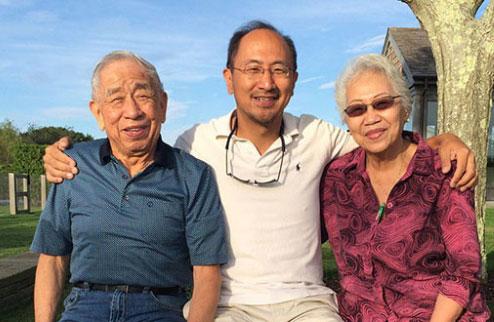Peter Yu ’83: Honoring the Past While Helping to Shape the Future

Across War and Oceans
When Charles Yu was a young boy in the 1930s, China was in turmoil. The central government was fighting internal revolutionary forces, poverty and crime were rampant, and imperialist Japanese forces had gained control of the northeastern provinces. Troops were steadily moving south toward Charles’s village when his family fled to Manila.

Along the way pirates hijacked their crowded ship, seizing the passengers’ valuables, before leaving with the loot—and the captain. The skilled first mate guided the ship into port, but the family faced new challenges in the Philippines, including discrimination against Chinese nationals. In December of 1941, Japanese marines landed close to their new home, forcing them to evacuate to a mountain hideaway, where they would live for eight months before returning to Manila.
At World War II’s end, Charles Yu resumed his education at a Chinese high school in Manila and went on to earn a medical degree. He met his wife, Marie, also a physician, before emigrating in the 1950s to the United States, where they raised four children and flourished professionally.
Building Healthier Bridges
Although he left China as a boy, Charles Yu retained a strong bond with his homeland. He and Marie founded a charitable organization to fund health care for the poorest children of Xiamen, near the village where he was born. The organization vaccinated thousands of children against potentially fatal childhood diseases.
In the United States, he established and for 20 years served as the chairman of the anesthesiology department at Potomac Hospital in Woodbridge, Virginia, where Marie also practiced anesthesiology. He founded a school for nurse anesthetists in conjunction with George Washington University and a savings bank in Virginia that served Asian immigrants, including war refugees from Southeast Asia.
A Son Inspired
“My parents are our heroes,” said Charles and Marie’s son, Peter Yu ’83, the managing partner of Cartesian Capital Group. “They have never stopped creating opportunities to give back to China. And because of their struggles and efforts, my life has brimmed with opportunities. My wife, Sandy, and I wanted to share that abundance in a way that acknowledges my parents’ sacrifice, values, and heritage.”
To honor his parents, Peter Yu and Sandra Mancini have established a global seminar fund that will send undergraduates to China. “No matter how technology shrinks distances, genuine understanding requires openness, direct engagement, and in-person experiences,” said Peter Yu. “My parents know firsthand that citizen-to-citizen understanding is critically important.”
The Drs. Charles C. and Marie S. Yu P83 Global Seminar Fund will allow generations of Princeton undergraduates to deepen their understanding of contemporary Chinese society. Led by Princeton faculty members, global seminars in China will include lectures, language classes, and excursions to sites relevant to the course.
“I’m grateful for Peter Yu’s and Sandra Mancini’s generous gift that will allow the University to offer global seminars in China virtually every year,” said Yu Xie, the director of Princeton’s Center on Contemporary China and Princeton’s Bert G. Kerstetter ’66 University Professor of Sociology and the Princeton Institute for International and Regional Studies. “One cannot really understand what’s going on in China without spending time there.”
“Nations sharing this small world of ours are ever closely interwoven,” said Charles Yu. “It is essential for all of us to know each other. And it starts with the young people.”
For information on supporting global seminars or the Center for Contemporary China, contact Kerstin Larsen '83 *17, assistant vice president for development/fundraising initiatives, at klarsen@princeton.edu or 609.258.8972, or Steve Staples, executive director for international development, at staples@princeton.edu or 609.258.9739.


